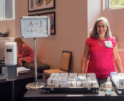
LaMae Allen deJongh – U.S. Human Capital & Diversity Managing Director, Accenture

By Caroline Cox
LaMae Allen deJongh seems like a woman who’s done it all. A Princeton University graduate with an economics degree, she moved her way up from an entry-level position at Accenture more than 22 years ago to her current role as U.S. Human Capital & Diversity Managing Director.
At Accenture, deJongh is responsible for managing a number of global financial services clients. She also recruits and trains new talent; she looks for traits like the ability to multitask and work well in teams. As part of her Human Capital & Diversity role she works on issues such as mentoring, work/life balance and flexibility, corporate citizenship, leadership development and bringing in a wide range of suppliers for the global company. Those she works with say her professionalism and refusal to micro-manage paired with her open-door policy and calm demeanor engenders a sense of confidence, and her “can-do” spirit is infectious.
Being active in her community, married and taking care of her 5-year-old son, Davyn, keeps deJongh busy. She leads a core team of professionals that influence and drive her agenda at Accenture and attributes her success at work to her passion for her job and commitment to her clients.
Here, deJongh talks to PINK about how women of all generations can reach their career goals and how quick questions just don’t exist.
PINK: What made you decide to stay at Accenture and work your way up?
LaMae Allen deJongh: I always share three reasons why: the first, without a doubt, is the people. It’s a pretty amazing group of people to be able to work with. We have a common goal and leverage each other’s strengths. It’s pretty amazing to see what can get done, and it’s also very stimulating to be around smart people. Second would be the opportunities. Even now, I continue to feel challenged; I’ve never really felt like I’m tapped out or that there’s nothing else to learn or a new role to try. The clients we work with, as well as leadership opportunities within the company, have really kept me energized. Lastly is the company’s ability and willingness to change. It was a very different place when I joined back in ’87, and it’s been amazing to see how nimble we are as a company.
PINK: What are the secrets to your professional success?
L.D.: Confidence. I think that has been very important for me to sustain the degree of confidence in my capabilities and what I can bring to the table. Also, [having] confidence in my team and, through that confidence, empowering them and allowing them to do great things and to give them flexibility. Not feeling the need to stifle the creativity but maximize everyone’s strengths and take time to step back and see what can come of that. And lastly, feeling strong enough to ask for help and not viewing that as a weakness or wondering how people will perceive you.
PINK: Do you have a mentor?
L.D.: I would say I have several. Depending on where you are with your career, there are different things you need—different insights or perspectives. I’ve always tried to keep a core network of mentors and I know it’s important to continue expand or refresh that. They’ve been very important to me, knowing that I had someone to go to and a trusted confidante to listen and not be judgmental, and to use as a sounding board. I have a good balance of mentors in Accenture and outside.
PINK: Was there a particular time when a mentor helped you?
L.D.: When I was promoted to partner and became an executive with the company. The bar was raised in terms of expectations and contributions. Being African-American and female, I felt even a greater set of expectations. I had to figure out what to focus on, above and beyond client servicing and [deciding] what I was going to be passionate about and what my agenda was going to be, while not overextending myself. Mentors helped me navigate and gain perspective.
PINK: What do women of all generations need to become successful at work?
L.D.: Active listening. I think women tend to do this quite well, but this is a differentiating attribute. You learn so much through active listening and asking questions and seeking to understand the individual and how they think. The second is being at ease communicating with everyone, regardless of their level, and being clear and concise when you convey your messages, thoughts and perspectives.
PINK: How has the recession changed your leadership style?
L.D.: I’m not sure I would say it’s changed my leadership style. I think it emphasized the importance of staying even more connected to our clients and our people. That requires greater sensitivity and attention: staying in close contact and navigating through uncertainties.
PINK: What is the best business advice you’ve ever received?
L.D.: There are two things that I think I draw from every single day. One is, “don’t sweat the small stuff,” and the other is, “trust your gut.” On any given day, there are things that pop up that you could spend a lot of time worrying about. Over time there are things you just have to let go of and know that it’s a better use of your time and energy to focus elsewhere. “Trust your gut” is about having confidence in what you feel and going with that, because usually your gut is right. Despite all the data-crunching and analysis, it’s always been good for me to go with what I think is right.
PINK: What do you look for in a prospective applicant?
L.D.: Part of our secret sauce here is understanding critical behaviors that, along with confidence, make for a strong candidate who can be successful in our environment for the long term. Examples of critical behaviors include critical thinking, or the ability to logically break down problems or issues into components that can be more easily identified so solutions can be found. Another example would be initiative, or “fire in the belly,” and going above and beyond. Another is confidence versus arrogance. Being confident in their abilities – I really look for those three attributes when speaking with potential recruits.
PINK: What is your biggest workplace pet peeve?
L.D.: When people say, “do you have time for a quick question,” because it’s never a quick question. [Laughs]
PINK: How do you balance Life/Work?
L.D.: I like to think of it in terms of priorities: my family and my career are both important priorities and I am constantly evaluating the trade-off that I feel comfortable with at the time. I like to think of it more as prioritization of what’s important to me and feeling good about it and not second-guessing myself.
PINK: How do you relax and rejuvenate?
L.D.: I love to work out, so that is usually the best relaxer for me. I also have a passion for culinary, so cooking is a way that I decompress and unwind. One of my personal goals is to explore my passion for culinary. I find it very gratifying and satisfying.
PINK: What do you like to cook?
L.D.: Well, I’m not big on pastries, so I focus much more on appetizer-type dishes. I love Italian; I have a few pasta dishes and meat dishes I like to do, but I have fun experimenting.
PINK: How are you active in your community?
L.D.: I’m on the board of my son’s nursery school in NYC, helping the school grow into a more full-fledged nursery and pre-K. I’m also a member of the board of directors for The Children’s Museum of Manhattan. It’s been quite exciting to work with a very interesting board whose goal is to help children grow and be successful globally.
PINK: Are you at the exact place you want to be in your career or is there another goal?
L.D.: I wish I were that deliberate in my planning. I am the type of person that’s probably never quite satisfied with where they are. There’s a constant drive towards wanting to do more. At Accenture, I feel like the opportunities are endless.
Recommended
-
Spring Sales Are Ready To Bloo...March 1st, 2024
-
Two Months Away!August 24th, 2023
-
Pink’s Signature Spring ...May 17th, 2023
-
One Rx For Employee Community ...April 19th, 2023
-
Contact PINKMarch 3rd, 2023















